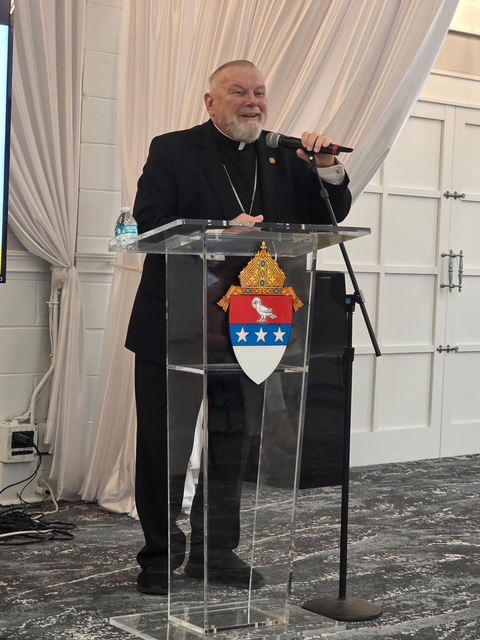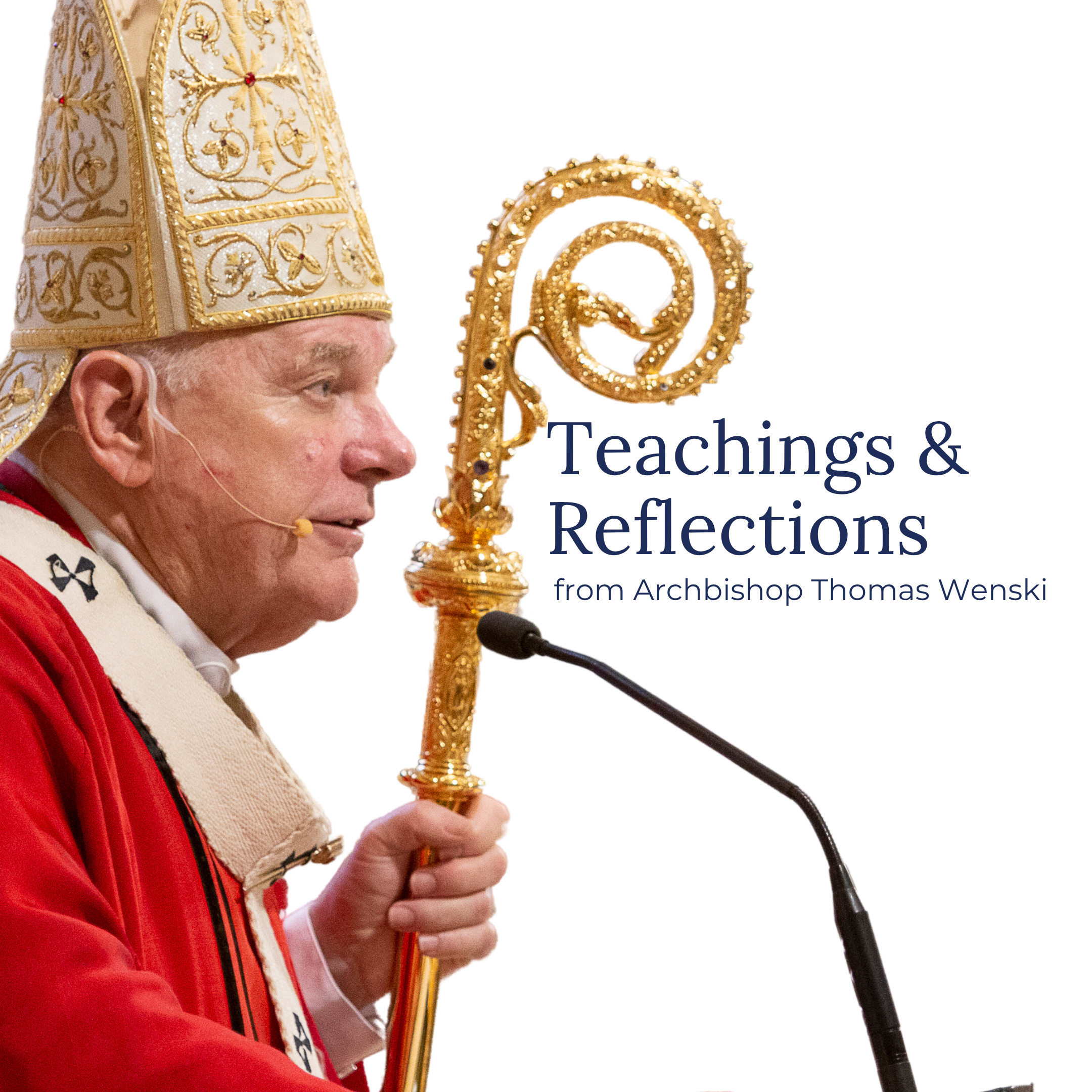By Archbishop Thomas Wenski - The Archdiocese of Miami

Photographer: Photographer: Courtesy Photo
Archbishop Thomas Wenski speaks at the 'Parish Twinning Program of the Americas' at the Catholic Pastoral Center in Nashville, Tennessee on Aug. 17, 2025.
Thank you for the invitation to speak here today.
I’ve known of the work of Teresa Paterson and before her Harry Hosey in Haiti for many years. I did spend a few months in Haiti in the late 70’s to perfect my Haitian Creole. So, I was not a “missionary” priest in Haiti, but I did minister as the parish priest of Haitians in South Florida for 18 years - that also involved me doing a circuit riding ministry celebrating Mass for Haitians throughout Florida.
Maybe perhaps because of that experience, I remember one time, when I was still a parish priest, I was asked to meet with a group of young people who had just returned from a mission trip to the Dominican Republic. Those of you that have gone on mission trips know how impactful and life changing these trips can be. I was asked to help them “unpack their experience.” These young people, young adults really, were pretty much upper middle-class kids, educated in Catholic schools, kids from Miami’s more affluent neighborhoods. And telling me about their experiences almost every one of them said that they had never seen or experienced poverty like they saw in that Dominican village. But then they said, “But everybody seemed so happy.” Now dire poverty is not a recipe for happiness; but by unpacking their experience, I helped them see that while poor, desperately poor, in material things, they were rich in other ways. Compared to these American college aged students, they were rich in relationships. The village was full of their cousins and relatives, there were aunts and uncles, godparents, brothers and sisters. Everybody knew everybody else. And then, I said to these young people, you are obviously well off in material things. You have phones, computers, cars, etc. But why are some people miserable, even with all these things? Because they were poor in relationships: many did not have siblings or even a second parent in the home, cousins might live thousands of miles away. And too often, the relationships they had were only virtual ones – through a screen and not with a real person. Lots of toys but no friends.
Haiti, as everybody seems to know these days, is an extremely poor nation beset by political violence in and around Port-au-Prince perpetrated by criminals “ak sapat” and criminals “ak kavat”: the criminal gang members shod in sandals and the criminal oligarchy dressed in coat and ties.
But Haitians are resilient: There’s a Haitian proverb: Depi yo pa koupe tèt ou, ou toujou gen espwa mèt chapo. If they don’t cut off your head, you always have hope to put on a hat.
Yes, Haiti is poor, desperately poor – in economic terms; but, in many other ways, Haiti is a rich country: it has its own language (Haitian Creole), a rich musical heritage (that is more than Kompa); Haitian art is world renown reflecting a rich culture, Haiti even has its own religion (Voudou) – and maybe most Haitians might no longer practice Voudou, its worldview shapes and influences all Haitians. And like their Dominican neighbors, Haitians are rich in relationships. The biggest source of “foreign aid” reaching Haiti are the remittances sent home by Haitians in the diaspora to help their relatives back home.
Poverty is relative – and to be faithful twinning missionary disciples, we must encounter the other in his/her humanity. This encounter is a two-way street. For no one is so poor that he doesn’t have something to give; nor is anyone so rich that he cannot receive something from the other. Missionary disciples receive as much if not more than they give.
This two-way street encounter is very important – and I think you do well by describing your efforts to “twin” your parishes with parishes in Haiti. To “twin” and not just “adopt” them.
Adoption suggests a “parent-child” relationship or simply paternalism. Twins are brothers and sisters – that’s the relationship we should foster. Paternalism breeds resentment – on both sides: the recipient feels demeaned; and the donor is upset by what he or she may perceive as a lack of gratitude.
St. Vincent de Paul, who was the Mother Teresa of his times, once said we must ask forgiveness of the poor for the bread that we give them.
When I was in seminary, I ran across an article written by a missionary priest who had been posted to Africa where he worked many years. He said that as a missionary he had to remind himself that he was a guest in his Father’s house. And as a baptized Christian he was certainly a member of the Father’s household; but working in a different culture, he could not claim his right as a member of the household, he had to comport himself as a guest. A guest respects the rules of the house. He doesn’t rearrange the furniture or help himself to the food in the refrigerator. A guest that would do that would be considered rude, perhaps arrogant, and would quickly wear out his welcome. Haitian proverb: afè kay moun se mistè – what goes on in other people’s houses is a mystery.
Sometimes I tell my new pastors to act like guests when they arrive at a parish – don’t start making changes in the liturgical décor, etc. After all it’s the parishioners’ church and not the priest’s. You have to get to know the people before you introduce changes – you have to know the culture of the place.
So as guests in the Father’s house, we are always in some ways on the outside looking in, and therefore let’s not be rash in rushing to judgment, or in jumping to conclusions, or coming up with something that we think to be the “right fit” and then running into a brick wall because “they don’t get it…”
In Miami, I used to celebrate 300 first communions in my main parish every year. So, I had a lot of young Haitian American kids living in a multi-cultural environment but raised by Haitian parents according to Haitian values and culture. This often causes some dissonance in the lives of these young people; but one teenager captured the clash of cultures that she experienced by wearing a T-shirt to school that simply said: “Don’t ask, you wouldn’t understand. It’s a Haitian thing.”
In any case, someone who behaves like a guest will be welcome as one.
Also, a missionary is not a tourist. Tourists, when they visit a country, rarely emerge from a protective bubble – and of course tourists pay a lot of money to go where they’re going and so they expect to be pampered. A missionary may have to pay a lot of money to go where he or she is going, but you’ll ruin it for everybody if you demand to be pampered. So, we have to act like guests in our Father’s house. Don’t demand to be pampered like guests in a hotel. The Father’s house is not a hotel.
In better times, when I flew between Miami and Haiti, the white people on the plane seemed mostly to be Evangelicals going to Haiti on mission trips. It seemed to be a bit like a type of “compassion tourism.” And perhaps I am mistaken in this, but my impression was that they were going to save the Haitians from themselves, to bring them the gospel (that they assumed the Haitians knew nothing about) and they seem to disparage what makes the Haitians rich despite their material poverty: their art, their music, their Creole language, their religiosity.
Of course, we can find such attitudes among Catholic “missionaries,” but I found it offensive for example that Pat Robinson after the 2010 earthquake said that God sent the earthquake to punish Haitians for their sins, especially for their practice of Voudou. Haitians are not poor because they are lazy; Haitians are not poor because they are under the spell of the devil. There is nothing in the Haitian DNA that explains or excuses the poverty of the island. But there are structures of sin that conspire to keep the Haitian down – but if you take them out of those sinful structures they can certainly thrive as the Haitians who come here to US have done quite well.
Sometimes, I joke that Haiti is a West African country lost in the Caribbean. Africa, especially West Africa, is where the Church is growing spectacularly: many vocations to priesthood and religious life (you may have noticed the number of African priests serving in the US). This happened in a little more than 100 years – thanks to the European missionaries that evangelized there. The same is true in Haiti: today the Haitian Church is almost totally Haitian – very few foreign missionaries remain. They died out – and there’s not many more foreigners to replace them.
Both Africa and Haiti have proven to be fertile soil for the gospel to take root. This might not be true of the elites -in Africa and in Haiti – they have been “Westernized” or secularized. But the vast majority have a religious world view. In a word, they are open to God, to the Infinite.
I mentioned Voudou and I said that it is a religion but also a world view, a way of understanding the world. Secularism is also a world view. As Christians, as Catholics, we live in the world (and much of the world lives in us) and so the world in which we live in influences us. You can have, for example, a good Catholic family goes to Church every Sunday, but their the 16-year-old gets pregnant and often the secular world view influences them to have her get an abortion. A Haitian can be a good Catholic, but some crisis arises in their life, a sickness perhaps and the world view influence by Voudou has them going to a Boko.
Of course, we want Catholics to be in the world, not of the world, to change the world. Christ came into an upside-down world to put it right side up. And we are called to live right side up. But those pagan world views – whether Voudou or secularism have their pull on us, that’s why we have the Sacrament of Penance.
We must evangelize but who is to say which type of paganism is better or worse.
To summarize:
Twinning involves a mutual exchange of gifts: No one too poor to give, no one too rich to receive. Recognize the riches of the Haitian people – they have much to offer.
Twinning is a relationship between equals – between siblings, not parent-child. Don’t treat the Haitians as children.
We are children of the same Father. The Father’s house is our home. But as a missionary behave as a guest.
Don’t blame the victim: Haiti is desperately poor but not because Haitians are lazy or somehow under the spell of the Evil One.
Haitian religiosity has its roots in Africa and that religiosity is good soil for the gospel to take root.
Sin turned the world upside down; Jesus came to put it right side up. As missionary disciples our baptism calls us to live right side up.

